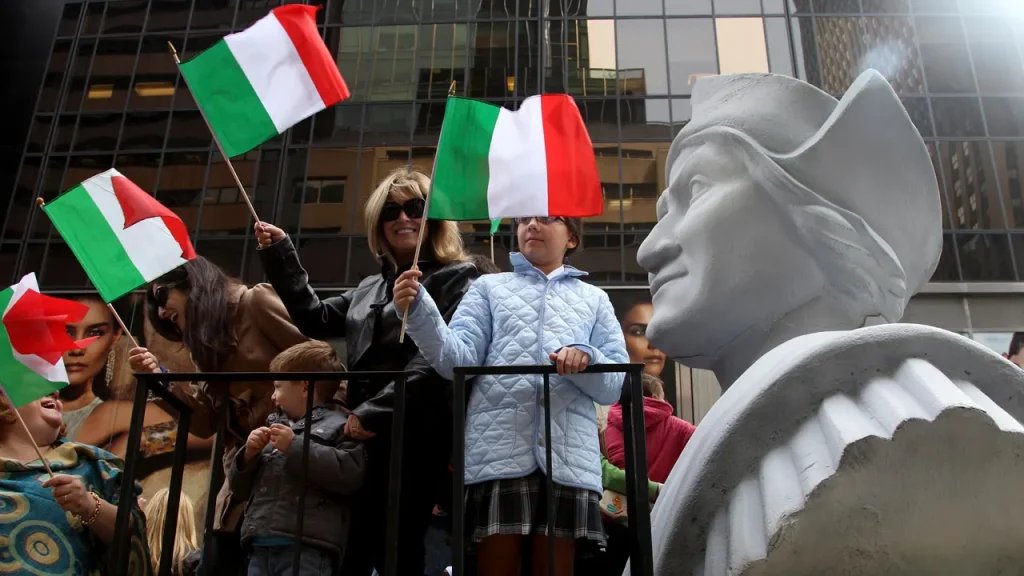Columbus Day Resurfaces in Political Discussions as Italian Americans Defend Heritage
The debate over Christopher Columbus has reignited just before this year’s Columbus Day holiday, five years after numerous statues of the Italian explorer were vandalized across America. The controversy recently made headlines again when photos resurfaced of New York City mayoral candidate Zohran Mamdani making an offensive gesture toward a Columbus statue in 2020 with the caption “Take it down.” This incident has sparked renewed conversations about Italian-American heritage, historical representation, and the complex legacy of Columbus in American culture.
In response to such sentiments, Italian-American organizations have been working diligently to protect their cultural heritage. Basil Russo, president of the Conference of Presidents of Major Italian American Organizations, expressed dismay at Mamdani’s actions, calling them “hurtful and detrimental to the Italian-American community.” The organization, which Russo leads, has grown significantly since 2020, expanding from 35 to 75 member organizations as Italian Americans unified to defend their cultural symbols. Russo emphasized that politicians should show the Italian-American community the same respect afforded to other cultural groups, suggesting that those with anti-Columbus views might benefit from learning more about the explorer’s historical significance to Italian Americans.
Many Americans remain unaware that Columbus Day originated from a tragic event in American history. In 1891, eleven Italian immigrants were lynched in New Orleans by a mob of over 5,000 people, marking the largest mass lynching in American history. The incident was so severe that Italy temporarily severed diplomatic relations with the United States. In response, President Benjamin Harrison declared a national celebration of Columbus Day in 1892 as a gesture to improve acceptance of Italian immigrants. Russo points out the irony that many who advocate for immigrant acceptance today were among those who demanded the removal of Columbus statues, failing to recognize the holiday’s origins as a response to anti-immigrant violence.
The assault on Columbus statues peaked during the summer of 2020, amid nationwide protests following George Floyd’s death. Monuments were toppled, beheaded, and vandalized across the country—from Minnesota to Boston, Miami to Richmond. Some statues were spray-painted with slogans like “George Floyd,” “BLM,” and even communist symbols, while others were thrown into rivers or repeatedly defaced until local governments removed them. These actions reflected a growing movement to reframe Columbus’s legacy, with critics focusing on accusations of genocide against indigenous populations rather than his role in exploration. This shift in perspective led to President Biden’s 2021 proclamation of Indigenous Peoples Day to be celebrated alongside Columbus Day on the second Monday of October, though the original holiday was never officially renamed.
The political tide may be turning once again, as President Donald Trump recently signed a proclamation officially recognizing the upcoming holiday as Columbus Day. “In other words, we’re calling it Columbus Day,” Trump declared during the signing, adding, “We’re back. Columbus Day. We’re back, Italians. We love the Italians.” This declaration received unexpected applause from the press corps present at the White House. Russo praised Trump’s decision, noting that it “changes the environment throughout the country” and signals an understanding of Columbus’s historical relevance to Italian Americans. For many Italian Americans, Columbus represents more than just an explorer—he symbolizes their community’s contributions to American society, from building infrastructure in cities like New York to serving in the military, where Italian Americans constituted the largest ethnic group fighting in World War II.
As Columbus Day approaches, the ongoing debate reflects broader questions about how America commemorates its complex history. New York City Mayor Eric Adams has sought to protect Columbus statues by designating them as historical landmarks, saying, “The beauty of New York City is that we celebrate and respect all our diverse communities and cultural heritage.” For Italian Americans like Russo, preserving Columbus’s legacy is about more than defending a historical figure—it’s about ensuring their heritage and contributions to American society are recognized and respected for generations to come. As the nation continues to wrestle with representations of its past, the Columbus Day controversy reminds us that historical symbols often carry deeply personal and cultural significance that transcends simplified narratives.


